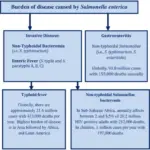Whipple disease is rare bacterial infection that most often affects your joints and digestive system. Whipple disease interferes with normal digestion by impairing the breakdown of foods, and hampering your body’s ability to absorb nutrients, such as fats and carbohydrates.
What is the Pathology of Whipple Disease?
The pathology of whipple disease is:
-Etiology: The cause of Whipple disease is type of bacterium called Tropheryma whipplei.
-Genes involved: None.
-Pathogenesis: The sequence of events that lead to whipple disease are: The bacteria affect the mucosal lining of your small intestine first, forming small sores lesions within the wall of the intestine. The bacteria also damage the fine, hairlike projections villi that line the small intestine.
-Histology: The histology associated with whipple disease shows mesenteric lymph nodes and large, foamy macrophages.
How does Whipple Disease Present?
Patients with whipple disease typically in all genders at all ages. The symptoms, features, and clinical findings associated with whipple disease include: Fever. Cough. Enlarged lymph nodes, Difficulty walking, Vision problems, including lack of control of eye movements, Confusion, Memory loss.
How is Whipple Disease Diagnosed?
Whipple disease is diagnosed by PCR to detect bacteria in biopsy specimens or spinal fluid samples, Blood tests such as CBC.
How is Whipple Disease Treated?
Whipple disease is treated by antibiotics.
What is the Prognosis of Whipple Disease?
The prognosis of whipple disease is poor If Whipple disease is untreated. If this condition is treated for a full year, the prognosis usually is good. Clinical remission occurs in approximately 70% of patients.



